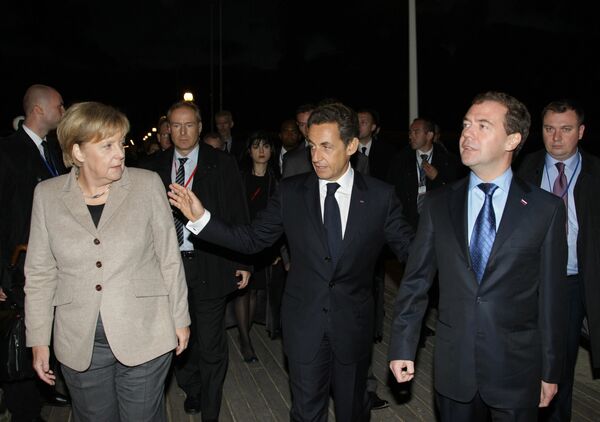As soon as the press conference of Dmitry Medvedev, Angela Merkel and Nicolas Sarkozy was over yesterday, it was clear that the German-Russian-French summit held in Deauville after a long hiatus would prompt mixed reactions, depending on the country, continent and convictions of the commentator. This is always the case when the meeting is billed as a brainstorming exercise and the participants won't be signing any international treaties, just discussing serious and confidential matters.
Russian responses have focused on the prospects for visa-free travel between Russia and the EU, even though a meeting with the leaders of two of the 27 EU member states can hardly be expected to accomplish much on this front.
U.S. headlines highlighted Medvedev's comment that Moscow is considering signing on to a common Euro-Atlantic missile defense system, as well as the fact that the Russian president agreed to attend the NATO summit in Lisbon on November 19 and 20. The Americans have signaled that President Obama will be in Lisbon, too, and it appears the two leaders will have much to talk about.
As for the response in Europe, one sentence cannot summarize the conflicting reactions in nearly 30 different countries. Yet some European media outlets, like The Financial Times, have reported on the summit in the context of the G20. Nicolas Sarkozy will assume the rotating presidency in November after the G20 summit in South Korea. And this was discussed in Deauville, of course.
However, Mr Sarkozy may assume the presidency of a defunct organization. As reported in The Financial Times article, Indian Prime Minister Manmohan Singh has warned that the G20 is losing its cohesion.
The problem is the competing and conflicting economic recovery measures taken by G20 countries. For example, the U.S. is spending to stimulate the economy while the UK is cutting spending to reign in budget deficits. In short, the world is facing the prospect of "currency wars", in which each country is trying to lower the exchange rate of its currency to make its exports cheaper.
Once again the United States is pressing China to sharply raise its exchange rate. Even Japan is upset, not to mention China's friends and allies like Brazil.
At this rate, the Seoul summit could lead to a confrontation, and Mr. Sarkozy's challenge will be to pick up the pieces afterward. European organizations have no role to play here. This is a game for the world's major economic players, Russia being one of them.
Nicolas Sarkozy is a maverick on the global stage. Hyperactive and brimming with big ideas for restructuring international relations (e.g. the Mediterranean Union), this "little Napoleon", as he's lampooned in cartoons in France, may stand little chance of being re-elected; however, he is exactly the kind of politician the world needs in this chaotic, transitional time in global politics - the kind of politician who can convince his partners that the system is broken and needs to be rebuilt.
The trilateral meeting in Deauville should not be regarded as a good-natured attempt by France and Germany to take Moscow by the hand and reintroduce it to the world of European politics after the fallout over the war between Russia and Georgia in August of 2008. The Americans and Europeans had no interest in who actually started the war in South Ossetia. Only Mr. Sarkozy took action and attempted to resolve the conflict.
The question is how to "reset" relations between Moscow and NATO, an organization which Russia does not see as a serious strategic threat and which cannot even produce a coherent concept to guide its activities? How can Moscow deal with 27 feuding countries when a single country can block a decision made by the other 26? There is simply no way.
Forging a united Europe, even without the crisis, is an unwieldy process without a clear ideological foundation. Europe is trying to mask its inner chaos with bureaucratic rituals like summits - summits at which many Europeans would like to see Russian representatives. It would make them feel more secure - one less problem to deal with. But this too is a sign of resignation, as if to say, "What do these Russians want? Concerns about security? Treaties? We're not in the mood."
It's no wonder Russian businesspeople and diplomats are not eager to attend these rituals. They find it easier to deal with Europeans on a bilateral basis. The most important issue for businesspeople, students, tourists and the other people with actual things to do in Europe is visa-free travel, not the resolutions and other documents produced by these pan-European summits and forums.
But if you can think big, like Nicolas Sarkozy, Angela Merkel, Dmitry Medvedev and some other European politicians; if you understand that the Euro-Atlantic structure is incapable of leading the world; if you understand that Russia is more that just a guest at these summits, then meetings like the one in Deauville are a necessity.
The views expressed in this article are the author's and do not necessarily represent those of RIA Novosti.

